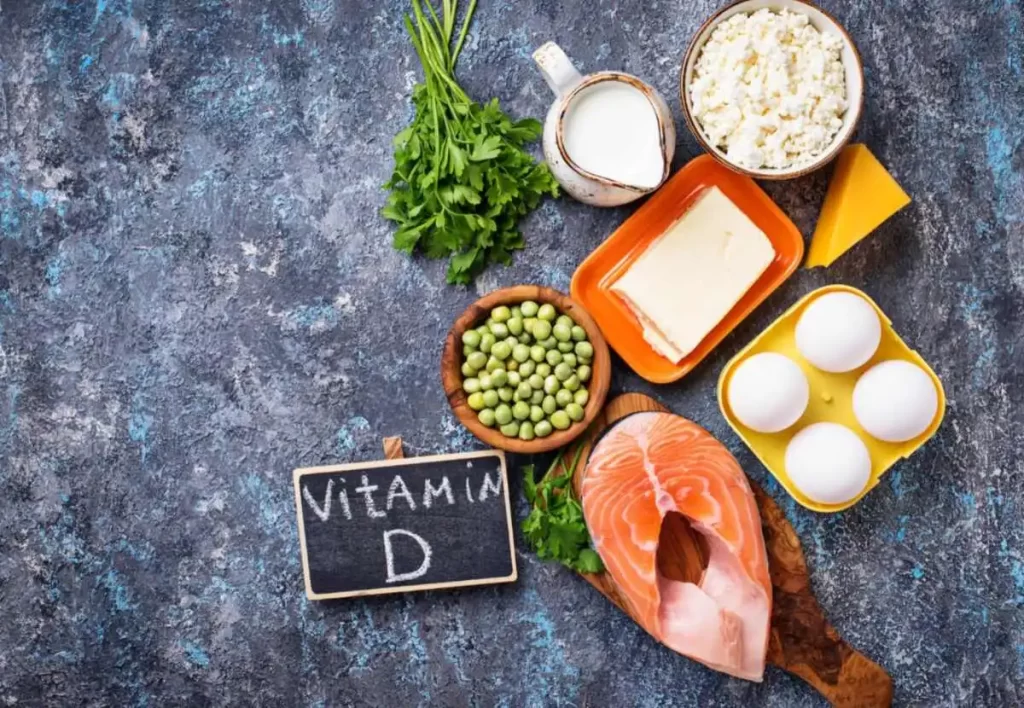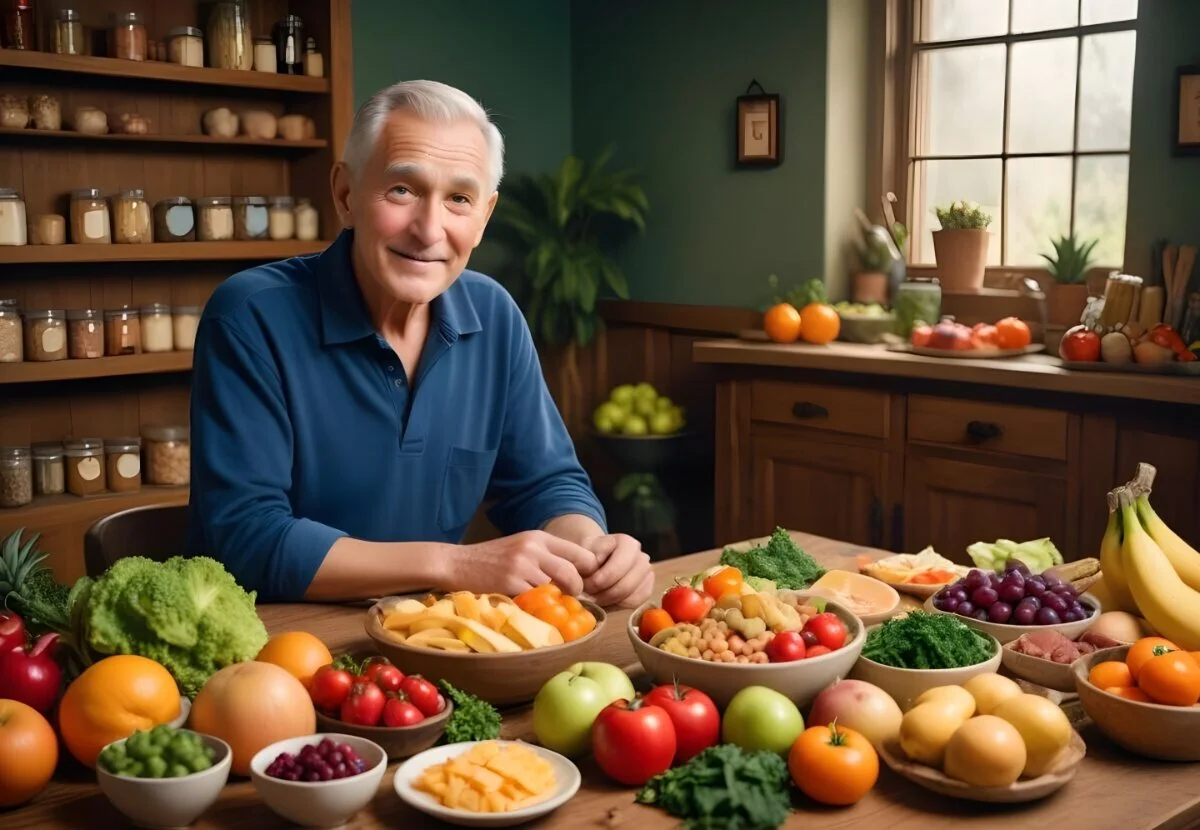Table of Contents
Introduction
As men age, their nutritional needs evolve, necessitating a greater focus on essential vitamins and minerals to maintain optimal health. After age 50, the importance of a balanced diet rich in vital nutrients becomes increasingly critical. Vitamins and minerals serve as the cornerstone of good health, playing pivotal roles in bodily functions from bone density and muscle strength to cardiovascular health and cognitive function. Ensuring an adequate intake of these nutrients is essential for preventing deficiencies and supporting long-term wellness and vitality.
This article delves into 15 crucial vitamins and minerals for men over 50, highlighting sources and the significance of each in maintaining a healthy, balanced lifestyle. Key nutrients such as vitamin D, magnesium, vitamin E, and vitamin C are thoroughly discussed, along with minerals like calcium, potassium, and zinc. Attention is also given to the importance of iron, vitamin A, and selenium, among others, underscoring their roles in supporting men’s health as they age. By providing a roadmap of where to find these essential vitamins and minerals, this guide aims to empower men over 50 with the knowledge to make informed dietary choices, laying the foundation for a healthier future.
Vitamin D
Vitamin D is essential for men over 50 as it helps in building and maintaining healthy bones by enabling the body to absorb calcium, which is crucial for bone strength. This nutrient also plays a significant role in muscle function, immune health, and brain cell activity due to its anti-inflammatory, antioxidant, and neuroprotective properties.
Vitamin D Benefits for Men Over 50
For men over 50, maintaining adequate Vitamin D levels is vital for bone health and to prevent conditions such as osteoporosis and osteomalacia. Additionally, Vitamin D supports muscle strength, which can help prevent falls—a common concern in this age group. It also aids in regulating immune function and reducing inflammation, which are crucial for overall health as one age.
Vitamin D Food Sources
While Vitamin D is not naturally abundant in many foods, it can be found in fortified milk, cereals, and fatty fish like salmon, mackerel, and sardines. The body also synthesizes Vitamin D through sun exposure, which can vary with factors such as time of day, season, and skin pigmentation. For those with limited sun exposure, especially older adults, fortified foods are a crucial source of this vitamin.
Vitamin D Recommended Daily Intake
The recommended daily intake of Vitamin D increases with age: 600 IU for individuals up to 70 years, and 800 IU for those older than 70. Considering older adults’ challenges in Vitamin D absorption and synthesis, supplements might be necessary to achieve these levels. Men over 50 should consult a healthcare provider to tailor a Vitamin D plan for their health needs and lifestyle.

Calcium
Benefits
Calcium is vital for maintaining strong bones and teeth, especially as men age and bone density decreases. It also plays a crucial role in muscle function, nerve signaling, and heart health. For men over 50, adequate calcium intake is essential to prevent osteoporosis and maintain bone health, which can help reduce the risk of fractures.
Calcium Food Sources
Men can meet their calcium needs through a variety of sources. Dairy products like milk, cheese, and yogurt are high in calcium. For those who prefer non-dairy options, dark green leafy vegetables such as broccoli and kale, as well as fish with edible bones like sardines and canned salmon, are excellent choices. Calcium-fortified foods and beverages, including cereals, fruit juices, and soy products, also contribute to daily intake.
Calcium Recommended Daily Intake
The recommended daily intake of calcium varies by age and gender. Men aged 51-70 should aim for 1,000 mg per day, while those over 70 should increase their intake to 1,200 mg per day to support bone health. Men over 50 need to consult with healthcare providers to ensure they are meeting their specific calcium needs, especially if they are at risk for osteoporosis or have other health concerns.
Vitamin B12
Vitamin B12 Benefits
Vitamin B12 plays a crucial role in maintaining cognitive function and overall health in men over 50. It aids in the production of DNA and red blood cells and supports nerve function. A deficiency in Vitamin B12 can result in symptoms that mimic aging, such as cognitive decline and decreased mobility, making its adequate intake vital for this age group 23.
Vitamin B12 Food Sources
The primary sources of Vitamin B12 are animal-based products. Men over 50 can increase their B12 intake through foods like clams, beef liver, and fortified cereals, which are particularly rich in this vitamin. For those following plant-based diets, fortified nutritional yeasts and certain fortified plant kinds of milk are valuable sources 24.
Vitamin B12 Recommended Daily Intake

Magnesium
Magnesium Benefits for Men Over 50
Magnesium is essential for numerous bodily functions, particularly in men over 50, where it supports muscle and nerve function, energy production, and bone health 6. It is involved in over 300 enzyme reactions, crucial for physiological processes such as protein synthesis and blood glucose control 7. Adequate magnesium intake is linked to reduced risks of chronic diseases like type 2 diabetes, heart disease, and certain cancers 6.
Magnesium Food Sources
Men over 50 can find magnesium in natural food sources like green leafy vegetables, nuts, seeds, and whole grains 7. Foods rich in dietary fiber generally provide magnesium, which can also be found in fortified foods and certain waters 7. However, magnesium content in water can vary significantly depending on the source 7.
Magnesium Recommended Daily Intake
The recommended dietary allowance for magnesium for men over 50 is 420 mg per day 7. This intake helps maintain the necessary levels considering the decreased absorption rates in older adults 6. It is crucial to consult healthcare providers to ensure adequate magnesium intake, especially to counteract age-related decline in natural absorption and to prevent deficiency 7.
Potassium
Benefits
Potassium is crucial for maintaining heart health, nerve function, and muscle strength, especially in men over 50. It helps regulate blood pressure and prevents conditions such as stroke and heart disease by balancing the effects of sodium 8. Additionally, adequate potassium intake is linked to improved bone health and a lower risk of osteoporosis 9.
Potassium Food Sources
Men over 50 can increase their potassium intake through a variety of foods. Leafy greens, beans, and potatoes are excellent sources. For instance, a baked Russet potato contains about 550 mg of potassium, while a cup of cooked spinach offers 558 mg 9. Other significant sources include fruits like bananas, which provide 326 mg per piece, and avocados, with 485 mg per avocado 9.
Potassium Recommended Daily Intake
The recommended daily intake of potassium for adults is between 3,500 mg and 4,700 mg. This range supports overall health and can be particularly beneficial for individuals at higher risk of hypertension and cardiovascular diseases 9. Men over 50 should aim for the higher end of this spectrum to counteract age-related decreases in potassium absorption and regulation 109.
Vitamin C
Vitamin C Benefits for Men Over 50
Vitamin C, known for its potent antioxidant properties, plays a crucial role in protecting cells from the damage caused by free radicals 11. For men over 50, it supports essential functions such as collagen production for healthy bones, skin, and blood vessels, and enhances the immune system’s ability to ward off diseases 13. Furthermore, Vitamin C facilitates the absorption of iron from plant-based foods, which is vital for maintaining energy levels and overall health 11.
Vitamin C Food Sources
Fruits and vegetables are the primary sources of Vitamin C. Men over 50 can benefit from including citrus fruits like oranges and grapefruit, red and green peppers, kiwifruit, broccoli, strawberries, and tomatoes in their diet 11. Additionally, less conventional sources such as acerola cherries and guavas provide a high concentration of this vitamin. To maximize Vitamin C intake, it is recommended to consume these foods raw or minimally cooked, as cooking can reduce the vitamin content 11.
Vitamin C Recommended Daily Intake
The recommended daily intake of Vitamin C is 90 mg for men over 50 11. This intake helps to cover essential bodily functions and counteract age-related declines in natural antioxidant protection and immune function. Since the body does not produce or store Vitamin C, it is crucial to consume sufficient amounts daily through diet or supplements to maintain these levels 14.

Vitamin E
Vitamin E Benefits
Vitamin E is crucial for men over 50 as it supports a healthy immune system and promotes good eye health and skin condition. Its antioxidant properties help protect cells from damage caused by free radicals, which are linked to aging and various diseases 1516. Vitamin E also plays a role in maintaining heart health, making it a vital nutrient for older adults 15.
Vitamin E Food Sources
Men can find Vitamin E in a variety of foods. Good sources include vegetable oils like wheat germ oil and safflower oil, nuts such as almonds and peanuts, and seeds like sunflower seeds. Green vegetables like spinach and fortified cereals also provide significant amounts of Vitamin E 151617. It is beneficial to consume these foods raw or minimally processed to preserve the vitamin E content, which can be sensitive to heat 15.
Vitamin E Recommended Daily Intake
The recommended daily intake of Vitamin E for adults is 15 milligrams 1618. This amount is essential to cover the body’s needs for antioxidant protection and overall health maintenance. For those unable to meet their Vitamin E needs through diet alone, supplements might be considered, but it’s advisable to consult a healthcare provider before starting any supplement regimen 1719.
Zinc
Zinc Benefits for Men Over 50
Zinc is integral to numerous physiological functions, including immune system support, wound healing, DNA synthesis, and protein production. It is particularly crucial for men over 50 as it aids in maintaining prostate health and may prevent the progression of age-related diseases 2021. Zinc’s role in cellular metabolism and its antioxidant properties also help in slowing down the aging process 22.
Zinc Food Sources
Zinc is predominantly found in a variety of foods. Oysters are the richest source, providing a substantial amount of zinc per serving. Other significant sources include beef, which is a major contributor to zinc intake in the United States, and fortified breakfast cereals. Plant-based sources like beans, nuts, and whole grains also contain zinc, though the bioavailability from these sources is lower due to the presence of phytates, which inhibit zinc absorption 232425.
Zinc Recommended Daily Intake
The Recommended Dietary Allowance (RDA) for zinc varies by age and gender. For men over 50, the RDA is set at 11 milligrams per day. It is essential to consult healthcare providers to ensure these intake levels are met, especially considering the potential for decreased absorption rates in older adults 2324.

Vitamin A
Benefits for Men Over 50
Vitamin A is crucial for maintaining healthy vision, immune system function, and organ function. Adequate intake of Vitamin A is associated with a reduced risk of several cancers and helps slow age-related eye degeneration 26. It also plays a key role in reproductive health and bone health, although the connection with bone health is not fully understood 26.
Vitamin A Food Sources
Vitamin A can be sourced from both animal and plant-based foods. Animal-based sources include liver, fish, dairy products, and eggs, which contain preformed Vitamin A or retinol that the body can use directly 2627. Plant-based sources, rich in provitamin A carotenoids like beta-carotene, include carrots, sweet potatoes, and leafy greens, which the body converts into retinol 2829. Eating these foods with a small amount of fat can improve the absorption of vitamin A 29.
Vitamin A Recommended Daily Intake
The recommended daily intake of Vitamin A for men over 50 is 900 mcg of retinol activity equivalents (RAE) 2830. This intake ensures adequate levels to support eye health, immune function, and skin health. However, managing intake to avoid toxicity, especially from animal-based sources is important. High intake from plant-based sources does not typically cause toxicity 2631.
Iron
Benefits
Iron is crucial for creating hemoglobin, which helps transport oxygen in the blood 32. Adequate iron levels are essential for maintaining energy levels, cognitive function, and overall health in men over 50. However, it’s important to manage iron intake carefully as excessive iron can lead to health complications such as liver and heart damage, and increased risk of Type 2 diabetes and neurodegenerative diseases 32.
Iron Food Sources
Men over 50 can meet their iron needs through a balanced diet. Rich sources of heme iron include meats like beef and poultry, and seafood such as tuna and salmon 33. Non-heme iron sources include legumes, nuts, seeds, and leafy greens, though these are less easily absorbed 34. Consuming vitamin C-rich foods like citrus fruits alongside iron-rich foods can enhance iron absorption 34.
Iron Recommended Daily Intake
The recommended daily iron intake for men over 50 is 8 milligrams, which generally does not change with age 33. Since iron absorption decreases with age, it is important to ensure that dietary intake is adequate to prevent anemia while avoiding excessive consumption that could lead to toxicity 3233.

Folate
Benefits
Folate, also known as vitamin B9, is vital for maintaining healthy cell division and promoting proper DNA synthesis and repair. For men over 50, adequate folate intake is crucial as it supports red blood cell production and helps prevent age-related hearing loss and cognitive decline 35.
Folate Food Sources
Men can find folate in a diverse range of foods. Legumes like lentils and beans are excellent sources, with one cup of cooked lentils providing about 90% of the daily value (DV). Leafy greens such as spinach and broccoli, as well as fortified grains, offer significant amounts of folate. Additionally, fruits like oranges and bananas, along with beef liver, are also good sources of this essential nutrient 35.
Folate Recommended Daily Intake
The recommended daily intake of folate for men over 50 is 400 micrograms (mcg) of dietary folate equivalents (DFEs). This intake helps maintain essential bodily functions and prevents folate deficiency risks such as elevated homocysteine levels, which are associated with an increased risk of heart disease 35.
Vitamin K
Vitamin K Benefits for Men Over 50
Vitamin K Food Sources
Men over 50 can find high levels of Vitamin K in dark green leafy vegetables such as kale, spinach, and broccoli 36. Other excellent sources include fruits like blueberries and figs, legumes such as soybeans, and vegetable oils. Fermented foods and certain meats also provide good amounts of Vitamin K 38.
Vitamin K Recommended Daily Intake
The recommended daily intake of Vitamin K for men over 50 is 120 micrograms (mcg). It is crucial to maintain consistent intake levels, especially for those on blood thinners like warfarin, to prevent fluctuations in medication efficacy 3639. Regular dietary intake is vital as the body does not store Vitamin K for long periods, and daily replenishment is necessary 39.

Selenium
Benefits for Men Over 50
Selenium is essential for various bodily functions, including reproduction, thyroid gland function, DNA production, and protection against oxidative stress and infections 404142. This trace element plays a critical role in maintaining heart health, cognitive abilities, and immune system efficiency, making it particularly important for men over 50 4142.
Selenium Food Sources
Men over 50 can obtain selenium from a variety of foods. Rich sources include seafood like tuna and halibut, meats such as poultry and beef, and plant-based options like Brazil nuts and whole grains 4041. The selenium content in these foods depends on the selenium levels in the soil where the plants were grown or the diet of the animals 4041.
Selenium Recommended Daily Intake
The recommended daily intake of selenium for men over 50 is 55 micrograms (mcg). This amount may vary based on individual health needs and dietary sources 40. It is important to monitor intake to avoid selenium deficiency, which can lead to serious health issues such as Keshan disease or Kashin-Beck disease 41.
Omega-3 Fatty Acids
Omega-3 Benefits for Men Over 50
Omega-3 fatty acids, particularly eicosapentaenoic acid (EPA) and docosahexaenoic acid (DHA), are vital for cardiovascular health, reducing the risk of heart disease and stroke. They also support brain health, potentially lowering the risk of dementia and cognitive decline. Additionally, omega-3s help maintain eye health and reduce inflammation, which is crucial for aging adults 4344.
Omega-3 Food Sources
The best sources of EPA and DHA are fatty fish such as salmon, mackerel, and sardines, which should be consumed at least twice per week. For those who do not eat fish, supplements containing EPA and DHA from algae are recommended. Alpha-linolenic acid (ALA), another form of omega-3, can be found in flax seeds, walnuts, and chia seeds. Although the body can convert ALA into EPA and DHA, the process is not very efficient, making direct sources more beneficial 434445.
Omega-3 Recommended Daily Intake
For optimal health, adults are advised to consume 250–500 mg of combined EPA and DHA daily, achievable through about 8 ounces of fatty fish per week. The Adequate Intake (AI) for ALA is set at 1.6 grams per day for men. It is important to balance omega-3 and omega-6 intake, aiming for an omega-6 to omega-3 ratio closer to 2:1 to enhance the body’s use of these fatty acids 4346.

Fiber
Benefits
Fiber is crucial for men over 50 as it helps manage several age-related health issues. It aids in regulating blood sugar levels, reducing cholesterol, and ensuring efficient digestive health, which collectively help in managing weight and reducing the risk of chronic diseases such as Type 2 diabetes and heart disease 47484950. Additionally, a diet rich in fiber can decrease the risk of colon cancer and promote bowel regularity, thus preventing constipation 4849.
Fiber Food Sources
Men over 50 can increase their fiber intake through a variety of foods. Excellent sources of soluble fiber include oats, peas, beans, apples, citrus fruits, carrots, barley, and psyllium, which help lower cholesterol and manage blood sugar levels 4851. For insoluble fiber, which aids in digestion and prevents constipation, whole grains, nuts, beans, and vegetables like cauliflower and green beans are beneficial 5152. Incorporating foods like whole wheat bread, brown rice, legumes, and fresh fruits and vegetables into daily meals can significantly enhance fiber intake 5251.
Fiber Recommended Daily Intake
The recommended daily intake of fiber for men over 50 is 30 grams. However, it’s important to note that most adults consume less than the required amount, with an average intake of about 16 grams per day 4950. Men over this age should focus on integrating high-fiber foods into their diet to meet their fiber needs, considering whole food sources over supplements for optimal health benefits 50.
Conclusion
Through the exploration of 15 essential vitamins and minerals for men over 50, it becomes evident how critical a balanced and nutrient-rich diet is to sustaining health and vitality during the later stages of life. Highlighting sources such as leafy greens, fortified cereals, dairy, and fatty fish, underscores the accessibility of these key nutrients. These compounds play pivotal roles in bone health, cardiovascular maintenance, cognitive function, and more, emphasizing the necessity for men over 50 to prioritize their intake to combat the natural aging process effectively.
Understanding the recommended daily intake and benefits of these necessary vitamins and minerals fosters a proactive approach to health, enabling men to make informed dietary choices. Maintaining a diet rich in these nutrients can significantly impact overall well-being, offering protection against common age-related conditions. As this guide lays the foundation for healthier dietary habits, it serves as a reminder of the importance of nutrition in supporting a life full of vigor and longevity.

FAQs
What daily vitamins are recommended for men over 50?
Men over 50 should consider taking several key dietary supplements to maintain their health. These include:
- Calcium: Essential alongside vitamin D to maintain strong bones, helping prevent fractures.
- Vitamin D: Important for overall bone health.
- Vitamin B6: Necessary for the formation of red blood cells.
- Vitamin B12: Crucial for maintaining healthy red blood cells and nerves.
Which multivitamins are best suited for men aged over 50?
The best multivitamin for men over 50 will typically include a balance of vitamins and minerals that cater to the specific health needs of older men, although specific product recommendations were not provided.
Where can one find a wide range of vitamins and minerals?
A diet rich in fruits, vegetables, whole grains, cereals, lean meats, and reduced-fat dairy products will naturally provide the essential vitamins and minerals needed by the body in the correct amounts and balance.
What are the key vitamins and minerals for men’s health?
Important vitamins and minerals for men include:
- Vitamins B, C, and D: Each plays a unique role in maintaining various aspects of health.
- Magnesium and Zinc: Both are crucial for numerous biological functions.
- Omega-3 Fatty Acids and Selenium: These are beneficial for cardiovascular health and overall well-being. A diverse diet that includes a variety of whole foods like fruits, vegetables, lean proteins, nuts, and seeds is recommended to obtain these nutrients.
References
[1] – https://ods.od.nih.gov/factsheets/Calcium-HealthProfessional/
[2] – https://www.webmd.com/healthy-aging/what-to-know-about-vitamin-b12-dosage-for-older-adults
[3] – https://www.healthline.com/nutrition/vitamin-b12-dosage
[4] – https://www.mayoclinic.org/drugs-supplements-vitamin-b12/art-20363663
[5] – https://www.webmd.com/diet/supplement-guide-magnesium
[6] – https://www.mensjournal.com/health-fitness/magnesium-the-missing-mineral-20140117
[7] – https://ods.od.nih.gov/factsheets/Magnesium-HealthProfessional/
[8] – https://www.webmd.com/diet/supplement-guide-potassium
[9] – https://www.healthline.com/nutrition/how-much-potassium-per-day
[10] – https://www.mensjournal.com/food-drink/potassium-2
[11] – https://ods.od.nih.gov/factsheets/VitaminC-Consumer/
[12] – https://www.ncoa.org/article/vitamin-c-and-older-adults-how-much-is-enough
[13] – https://www.healthline.com/nutrition/vitamin-c-benefits
[14] – https://www.webmd.com/diet/foods-high-in-vitamin-c
[15] – https://www.healthdirect.gov.au/foods-high-in-vitamin-e
[16] – https://www.mayoclinic.org/drugs-supplements-vitamin-e/art-20364144
[17] – https://ods.od.nih.gov/factsheets/VitaminE-HealthProfessional/
[18] – https://www.webmd.com/vitamins/ai/ingredientmono-954/vitamin-e
[19] – https://www.webmd.com/diet/supplement-guide-vitamin-e
[20] – https://www.ncbi.nlm.nih.gov/pmc/articles/PMC7424038/
[21] – https://www.hollandandbarrett.com/the-health-hub/vitamins-and-supplements/minerals/zinc/zinc-benefits-for-men/
[22] – https://www.webmd.com/diet/foods-high-in-zinc
[23] – https://ods.od.nih.gov/factsheets/Zinc-HealthProfessional/
[24] – https://www.mayoclinic.org/drugs-supplements-zinc/art-20366112
[25] – https://ods.od.nih.gov/factsheets/Zinc-Consumer/
[26] – https://www.healthline.com/nutrition/vitamin-a-benefits
[27] – https://www.medicalnewstoday.com/articles/324493
[28] – https://www.nia.nih.gov/health/vitamins-and-supplements/vitamins-and-minerals-older-adults
[29] – https://www.healthline.com/nutrition/foods-high-in-vitamin-a
[30] – https://ods.od.nih.gov/factsheets/VitaminA-HealthProfessional/
[31] – https://www.healthline.com/nutrition/vitamin-a
[32] – https://www.ioaging.org/aging/should-older-adults-take-iron-supplements-revisiting-a-controversy/
[33] – https://www.webmd.com/diet/iron-rich-foods
[34] – https://www.healthline.com/nutrition/how-much-iron-per-day
[35] – https://www.webmd.com/food-recipes/calcium-vitamin-d-foods
[36] – https://www.healthline.com/health/foods-high-in-vitamin-k
[37] – https://www.webmd.com/vitamins-and-supplements/supplement-guide-vitamin-k
[38] – https://ods.od.nih.gov/factsheets/VitaminK-HealthProfessional/
[39] – https://ods.od.nih.gov/factsheets/VitaminK-Consumer/
[40] – https://ods.od.nih.gov/factsheets/Selenium-Consumer/
[41] – https://www.medicalnewstoday.com/articles/foods-with-selenium
[42] – https://rootd.com/blogs/vitamins-minerals-101/selenium
[43] – https://www.healthline.com/nutrition/how-much-omega-3
[44] – https://www.webmd.com/healthy-aging/what-to-know-about-fish-oil-dosage-for-older-adults
[45] – https://ods.od.nih.gov/factsheets/Omega3FattyAcids-HealthProfessional/
[46] – https://www.healthline.com/nutrition/12-omega-3-rich-foods
[47] – https://bestcaremn.com/blog/high-fiber-foods-for-seniors/
[48] – https://www.smchealth.org/sites/main/files/file-attachments/senior_fact_fiber.pdf?1485884271
[49] – https://www.griswoldcare.com/blog/high-fiber-foods-for-seniors/
[50] – https://www.health.harvard.edu/blog/should-i-be-eating-more-fiber-2019022115927
[51] – https://www.mayoclinic.org/healthy-lifestyle/nutrition-and-healthy-eating/in-depth/fiber/art-20043983
[52] – https://www.webmd.com/healthy-aging/increased-fiber-important-older-adults








Everything is very ooen with a very cleqr explanation of the challenges.
It was definitely informative. Your website is very helpful.
Many thanks for sharing! https://Odessaforum.Biz.ua/